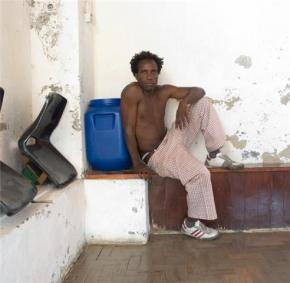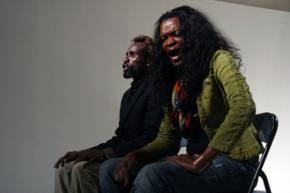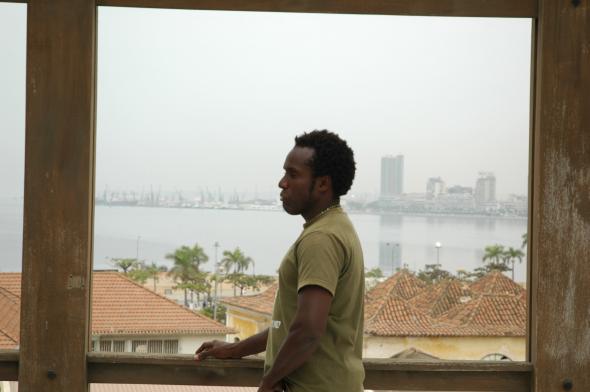Meirinho Mendes, actor extraordinary
Meirinho Mendes was born in the early 70s in the city of Luanda, where he spent a childhood that he considered ‘fantastic’. In the eyes of a child, this “was a city with balance, where you could play in the street and you thought it was then place where you would always go and where you would love to live.” From the family and socio-political point of view, however, Luanda was jumpy. Then, when he was 14, he spent six months in Portugal. Like many young Angolans whose families wanted to shelter them from the war and the social instability that the country was living through, he put a foot outside the country. But he came back for five years and was only off to Lisbon again when he was 19 and already a young man. The tools he had to face up to his destiny were his taste for adventure, his willingness to throw himself into adventures, belief in himself and a still dormant talent.
I ask him what those first adventures abroad were like: “the first time was difficult. I was very young and came to a new country which cut me off from my family. The second time it was because I chose to. I came in search of a dream and I found it right in front of me.”

What dream was that? To pursue a life in the theatre. And that’s how Meirinho changed what life gave him into interesting experiences. He thinks of himself as someone who is always in training, but this came in stages, on a triangle that was Angola, Portugal and Spain. The start of his career in the theatre was when he joined the children’s troupe BÁBÁ, which was on stage in the Barraca theatre, in Lisbon. He spent four years here playing parts in works for children. Then he had a stint in classical theatres such as the D. Maria II, the São Carlos or the Teatro São João in Oporto. In terms of the work that left a mark on him, there was “Edmond” by David Mamet, staged by Adriano Luz, “La Isola Desabitata” by Joseph Haiden, staged by Luís Miguel Cintra, in the great school of theatre craft which is the Cornucópia. Then there was a part in a review in the Maria Vitória theatre in the Parque Mayer and another with one of the most dynamic and daring theatre troupes in Portugal, o Bando. He had parts in a number of television series (with Jorge Queiroga), and found out that he liked theatre more. Then he went to Spain, where he also did TV series and worked a lot as a storyteller. He broadened his horizons there and devoted himself to training: he took a course in theatre and cinema in the Madrid autonomous university, he did courses in choreography, clowning and storytelling in the Accion Educativa in Madrid. He worked with Spanish stage managers and directors. He had parts in the Angolan films “O Comboio da Canhoca” (The Canhoca Train), by Orlando Fortunato, and “A Cidade Vazia” (The Empty City), by Maria João Nganga.
 A director of actors
A director of actors
He has recently had a new experience in the audiovisual field: he was pro-active in the setting up of the first private television channel in Angola, TV ZIMBO, as a director, working with actors, and in casting and selection, as a script reviewer and as an actor.
And it was in his native land that all the adventure of acting started. The Elinga Teatro has been the starting point for many dreams, the point where talent and expectations came together, a place where those Angolans who had travelled and picked up the tools of their trade on the way could get together again. In a city with a dearth of culture, this space in downtown Luanda – with its unchanging cultural vein – has been a strategic platform where young Angolans can dedicate themselves to performing. Apart from the theatre group that is always bringing out new people, there is an atmosphere which is contagious and informal, where you can get to know things, try out initiatives and experiment with all those who go through its doors.
“I came into this space through the good offices of an actor, ‘Válvula’, who was my swimming teacher. This is where I discovered my potential for this artistic universe that is the theatre.” Meirinho tells this story, backing up an old tale that runs as follows: “if no one is around at the right time listening in on our signals, we could spend our whole lives on the edge of a real passion, of our destiny, or of our real vocation.” Others will always act as our mirror. And during this journey through the theatre, close contacts and working sessions with men of the theatre were fundamental for his development as a person and as an actor. José Mena Abrantes, Rogério de Carvalho, Federico Martin Nebras, Rui Pisco, João Brites, Maria João N´ganga, Eleonore Didier, to name but a few. He adds: “And all those who directly or indirectly contributed to the way I meshed with the theatre, they all played a part.”
He lives the life of Angola in the most natural way and with a connection that is never broken. He comes back regularly to see again the people he likes. He feels a social responsibility towards the country: “I need to play my part in rebuilding Angola’s cultural identity, even though there are many times when this is not easy. More awareness is needed, more support for arts in general and for the theatre and cinema in particular.” This is the stance he takes.

Meirinho would like to be more active, more engaged in his work, “contributing towards the building of a society that is pluri-cultural and dynamic from the point of view of creative work.” And it’s in this way that he offers to share his experience with the country. He reckons that there’s an important starting point in the theatre that is most commonly found in Angola – neighbourhood groups, the self-taught, amateurs – but he reminds us that the next steps are fundamental. “There has to be investment in research, directing, training, production, and a policy that covers all these things and supports them. There’s no lack of talent!”
Saving cultural history
Meirinho Mendes thinks that in the world of Angolan culture the priority is “to save, analyse and give a public voice to the cultural history of Angola and Africa. This has been lost over time, what with wars and the colonisation that the continent has gone through, and Angola more than most.” This violence, these troubles that Angola has had to cope with “mean that there is a gap of something like four decades when part of our cultural identity was shaken. It was treated like something secondary.” Culture is of vital importance to bring society together and create solid values. “A people that does not preserve its culture loses its identity and its value base as a result and we end up turning to material things and unfettered consumerism.” Such is the actor’s diagnosis.
 Recently, there has been the project “Formigas”, staged by Rogério Carvalho and written by Boris Vian. It has meant a deep journey into the principles and aims of the theatre, through a complete process of conception, rehearsals and bringing it to the stage. “It has been a demanding process, because of the staging, the way the text is written and by how Rogério sees the theatre. It makes me think about the theatre itself beyond the work in hand. It also gives a lot back, through the sharing of knowledge and the deep friendship that we have created, the three of us, me, him and Dulce Baptista.” The project was put on by the Fundação Sindika Dokolo, where Meirinho Mende has collaborated since the 1st Luanda triennial, with a second set for this year. Currently, Meirinho’s time is taken up with “As Formigas” on tour. This involves a number of countries and the play has already been put on in France, Portugal, Brazil, and provinces in Angola. And there’s no shortage of projects: there are two new plays in the pipeline, one with Miguel Sermão and the other with Rogério de Carvalho. And for the first time he’s producing a film.
Recently, there has been the project “Formigas”, staged by Rogério Carvalho and written by Boris Vian. It has meant a deep journey into the principles and aims of the theatre, through a complete process of conception, rehearsals and bringing it to the stage. “It has been a demanding process, because of the staging, the way the text is written and by how Rogério sees the theatre. It makes me think about the theatre itself beyond the work in hand. It also gives a lot back, through the sharing of knowledge and the deep friendship that we have created, the three of us, me, him and Dulce Baptista.” The project was put on by the Fundação Sindika Dokolo, where Meirinho Mende has collaborated since the 1st Luanda triennial, with a second set for this year. Currently, Meirinho’s time is taken up with “As Formigas” on tour. This involves a number of countries and the play has already been put on in France, Portugal, Brazil, and provinces in Angola. And there’s no shortage of projects: there are two new plays in the pipeline, one with Miguel Sermão and the other with Rogério de Carvalho. And for the first time he’s producing a film.

Meirinho has a voice which conveys conviction, the look in his eye is steadfast, his body unflinching, though bursting at times with a provocative impetuosity. But he doesn’t put up with what he doesn’t like. He’s an actor with great vitality: his energy spills over and has to be worked on with the discipline that the theatre demands. And this at times is difficult because Meirinho is, as a person, over the top. But this very feature, channelled into the theatre, can give birth to genius. There’s a phrase of Stanislavski’s that he has chosen, as it symbolises how the art of acting comes close to life: “In our art we need to live the part at each moment that we play it and every time we play it. Each time that it is recreated, it must be lived through again and it must be in our bones again.” Being an actor is to live in a permanent state of risk. The art depends on the power that is transmitted through gesture and word. It is emotionally draining, and the uncertainty can be overwhelming. Life and the theatre must be lived with great intensity, and if you take the risk seriously, it can consume you. We all have a refuge that shelters us in times of anguish. Meirinho recognised that what gives him most stability is “the love and trust of my family, my companion, son, sisters and brothers, mother and father and those true friends who never call into question the value of my friendship for them.” So this is how his struggle will continue.
in AUSTRAL nº 81, article provided by TAAG - Linhas Aéreas de Angola